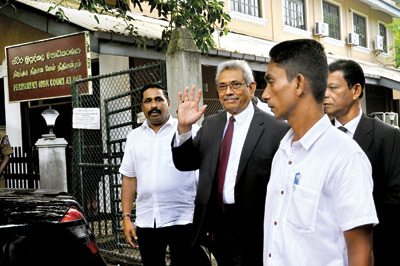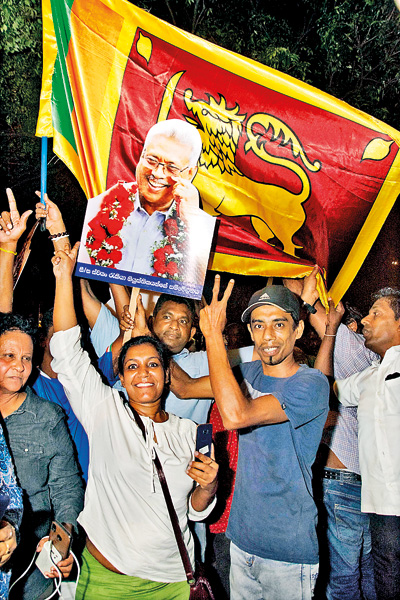News
Hotly contested arguments, counter arguments end with CA’s unanimous dismissal of case against Gota
A 11th hour legal battle on the citizenship of Sri Lanka Podhujana Peramuna (SLPP) Presidential candidate Gotabaya Rajapaksa, ahead of nominations tomorrow, saw hotly contested arguments and counter arguments on the executive powers of the Presidency, particularly during the intervening period between a President being elected to office and constituting a Cabinet of Ministers.

Gotabaya Rajapaksa arriving at the Court of Appeal on Thursday. Pic by Priyantha Wickramaarachchi
In a unanimous decision, the Court of Appeal (CA) on Friday (4) evening dismissed the petition filed by 2 civil society activists, challenging the citizenship of Mr Rajapaksa. In his order, CA President Justice Yasantha Kodagoda declared that, “formal notices of this application should not be issued to the respondents, and the application should therefore be dismissed,”
On Friday, the 3-member bench, comprising Justices Yasantha Kodagoda (President), Arjuna Obeysekera, and Mahinda Samayawardana, inquired whether the President had absolute powers during the intervening period of his elevation to office and constituting a Cabinet of Ministers. Comprehensive arguments and counter arguments were submitted before the CA delivered its Order by 6 pm, in Courtroom No.301.
Romesh De Silva P.C., appearing on behalf of Gotabaya Rajapaksa, alleged, this application was filed for vengeance by political opponents of his client, just days before he is scheduled to file nomination papers to contest in the upcoming Presidential poll under the SLPP banner.
Pointing out that the Petitioners did not file this application on public interest, Mr De Silva told the CA that, even in the petition, former President and current Opposition Leader Mahinda Rajapaksa, who is one of the Respondents, was addressed in his personal capacity as ‘Mr’, whereas, the other Respondents were addressed as ‘Honourable’. On the next day, Counsel for the Petitioners, Gamini Viyangoda and Prof. Chandraguptha Thenuwara, Attorney-at-Law Suren Fernando, apologised to the CA for the error and assured there were no hidden intentions or bad faith in this regard from the petitioners, as it was he who finalised the petition within a short period of time.
The bench posed a set of questions to the Counsels of the 5 Respondents, on the legality of obtaining citizenship under Section 5 (1) of the Citizenship Act, and inquired, in particular, whether there is any disparity between the citizenship by descendant and dual citizenship inherited.
Counsel were requested to forward written submissions on the questionnaire. Due to time constraints, the bench directed Counsel several times to stick to the core Legal arguments.
Mr De Silva brought to the attention of the CA that the Petitioners alleged that his client obtained citizenship through a fraudulent process, branding him a fraud, along with supporting documents from Police ‘B’ reports and a letter one of the Petitioners wrote to Acting Inspector General of Police (IGP). “Where is the fraud?,” Mr De Silva asked, noting that these kinds of baseless allegations impact his client’s candidacy.
He also indicated that the Petitioners claim, that the alleged illegal citizenship granted to Mr Rajapaksa is a “threat to national security and territorial integrity of Sri Lanka” whereas, it was Mr Rajapaksa who functioned as wartime defence Secretary for over 10 years, risking his own life for the benefit of the country.

Celebrations outside the court premises after the verdict on Friday . Pic by Indika Handuwala
Stressing that his client, Mr Rajapaksa never applied for a Dual Citizenship certificate, as media termed in the public domain, Mr De Silva argued, he only secured an Order of declaration to resume his citizenship of his country of birth .
Gamini Marapana P.C., representing former President and Opposition Leader Mahinda Rajapaksa, said this application is an ultra violation and was filed to insult his client, without any Legal grounds. He informed the CA, he aligns himself with the comprehensive submissions of Romesh De Silva P.C., appearing on behalf of Gotabaya Rajapaksa.
On Wednesday (2), the Attorney General’s Department informed the CA that the Department of Immigration & Emigration did not possess documents related to Gotabaya Rajapaksa’s dual citizenship certificate. Senior Deputy Solicitor General (SDSG) Nerin Pulle, who appeared for the Controller General of Immigration & Emigration, told the CA that the department had been digitized in 2007 and that, dual citizenship records dated before that were not available there.
Making his submission, Suren Fernando argued that Mr Rajapaksa’s dual citizenship record was null and void and has no force or effect in Law.
He noted that, while Gotabaya Rajapaksa was a Sri Lanka citizen by birth, he ceased to be a citizen of this country on January 31, 2003, when he became a US citizen. He had to then apply to obtain dual citizenship to the relevant ministry.
Mr Fernando told court that Mr Rajapaksa’s dual citizenship certificate had purportedly been approved by then President Mahinda Rajapaksa on November 21, 2005. Mahinda Rajapaksa had been sworn in as President on November 18, 2005, which was a Friday. Accordingly, November 21 was the following Monday.
He noted that, prior to assuming the office of the Presidency, Mahinda Rajapaksa had been the Prime Minister (PM). “Upon assuming the Presidency, he ceased to be the PM and an MP. With the PM ceasing to exist, the Cabinet also stood dissolved by operation of the Law,” he stressed.
Mr Fernando noted that President Rajapaksa appointed a PM on November 21, 2005, the Cabinet of Ministers on November 23, 2005, and on December 8, 2005, he assigned the subjects and functions of the Ministers.
He asserted that, under the terms of the Constitution, there was no Cabinet. Therefore, Secretaries to the Ministries too, had ceased to hold office, at the time the President signed the dual citizenship certificate of Gotabaya Rajapaksa. Accordingly, Counsel argued that the President was not entitled to be considered the Minister in charge of citizenship on November 21, 2005, when he signed the dual citizenship certificate of his brother.
Mr Fernando told Court that, under Section 19 (2) of the Citizenship Act, only the subject Minister could issue a certificate of dual citizenship. He argued that the person who is said to have made the declaration, making Gotabaya Rajapaksa a citizen, was not the Minister in charge of citizenship on the date he signed it. Accordingly, he submitted that, the entire document was a nullity and amounted to a blank piece of paper.
Stressing that a non-citizen cannot contest the Presidency, Mr Fernando asserted that it was undesirable for a non-citizen to be appointed as President of the country. “If such a thing were to occur, it could be a grave danger to the security, defence and territorial integrity of the republic, even if he were to be appointed for one day,” he added.
SDSG Nerin Pulle though, countered that the President actually did have powers to sign Gotabaya Rajapaksa’s dual citizenship certificate, as the relevant minister, as he continued to exercise his functions as Head of Government and the Executive, in the absence of a Cabinet. SDSG Pulle argued that the 1978 Constitution granted the President “plenary executive power.”
He further informed that Article 44 (2) of the Constitution, which was in existence in 2005, provided the President the power to retain any subjects he had not assigned to Cabinet. “In order to obtain dual citizenship, an application must first be made to the relevant minister and the minister must then make a declaration on the citizenship,” he pointed out. “Accordingly, in this case, the President had signed the certificate as per the Citizenship Act, in his ministerial capacity and therefore, the requirements to obtain the dual citizenship certificate had been fulfilled,” he insisted. “There was also no Legal requirement for a Secretary to sign the certificate,” he observed.
On Thursday (3) afternoon, the 2nd day of the proceedings, senior Lawyer Chanaka De Silva P.C., representing the 3rd Respondent- Minister of Internal Affairs- submitted to the CA, in detail, that the absolute powers of the Executive Presidency, which the defence team claimed as ‘plenary powers’, cannot be the case, when one considers the current Constitution, whereas many Amendments were passed in recent times to devolve powers to various branches of government, including the Provincial Councils (PCs).
Arguing that the President is a mere creature of the Constitution, where Presidential powers are derived from, Mr De Silva pointed out that, according to Article 43 of the Constitution, the President has to be held responsible to Parliament and continue to function as Head of State, but direction of the government is collectively vested with the Cabinet of Ministers. “The President is a creature of the Constitution and he cannot rule as a given divine right,”
Attorney at Law Suren Fernando, with Niran Anketell and Khyati Wikramanayake, appeared for the Petitioners. Romesh de Silva P.C. with Palitha Kumarasinghe P.C., Ali Sabry P.C., Sugath Caldera, Ruwantha Coorey, Harith De Mel and Namik Nafath instructed by Sanath Wijewardene, appeared for Gotabaya Rajapakse. Gamini Marapana P.C., and Naveen Marapana P.C. appeared for former President Mahinda Rajapaksa.
It was exactly 6.05 pm, Friday (4), when the Justices of the CA entered Courtroom No 301 packed with Lawyers, MPs, along with religious leaders, to deliver their order. Many were standing outside the CA entrance, due to lack of space inside.
CA President Justice Yasantha Kodagoda commenced reading the order, “This court has arrived at a unanimous finding. Formal notices of this application should not be issued to the Respondents, and the application should therefore be dismissed”. There was cheering and clapping in the chamber from Lawyers and supporters.
Making an order to maintain silence in the chambers, Justice Kodagada condemned the poor conduct of those who engaged in such practice, noting that, “It is saddening, shocking, and disgusting conduct.” The defence team led by Romesh De Silva, P.C. apologised to the bench repeatedly, as efforts were being made by fellow Attorneys-at-Law to calm the roaring crowd. “I am very sorry my Lord, extremely sorry…I totally agree with that. Without reservation. I am ashamed. Very, very sorry.”
Justice Kodagoda noted, “I assume no Attorneys-at-Law participated in that disgraceful conduct. If there is any evidence to that effect, such Attorneys-at-Law shall be dealt with in terms of the Law”. Special security measures were in place around the courtroom, ahead of the Order from the bench.
Minutes later, the sound of firecrackers filled the air, as party supporters gathered near the Supreme Court complex, celebrated the CA verdict. JO MPs were seen giving voice cuts to media personnel outside the CA, giving political speeches over the verdict.

